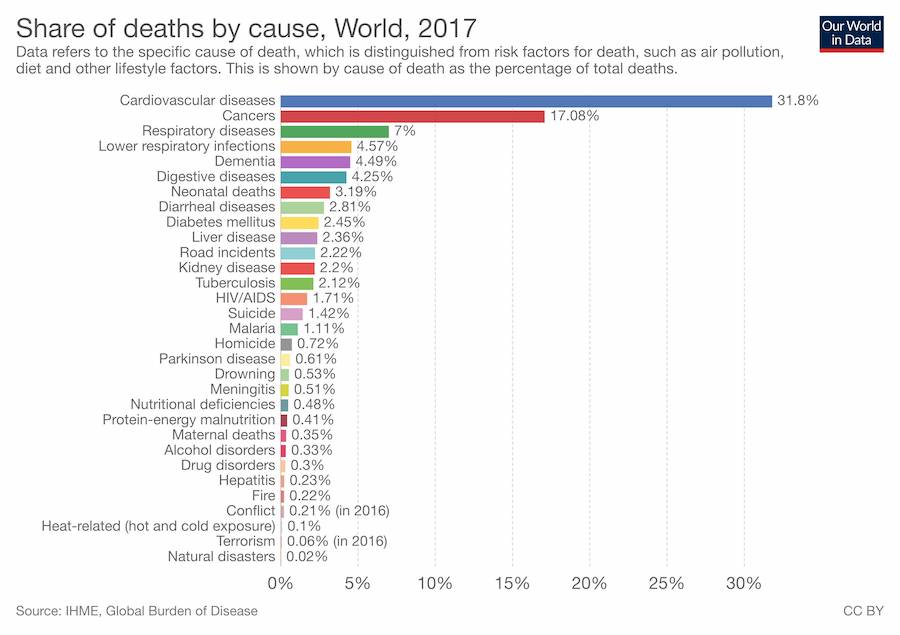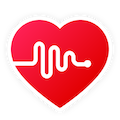High Blood Pressure
More than one in four adults is affected by hypertension, or high blood pressure as the condition is commonly known. Despite its high prevalence, high blood pressure has many serious risks associated and should not be underestimated. Read on to learn everything you need to know about high blood pressure, its causes, risks and treatment.
Contents:
What is high blood pressure?
If your blood pressure is high, it means that your heart must use a greater force to provide the body with sufficient blood.
Hypertension is thereby defined as a permanently and situation-independent raised blood pressure with values above 140 mmHg systolic and 90 mmHg diastolic (as defined by the World Health Organization). The following table exhibits the different severity stages of the condition.
| Systolic (mmHg) | Diastolic (mmHg) | |
|---|---|---|
| Mild hypertension | 140 - 159 | 90 - 99 |
| Moderate hypertension | 160 - 179 | 100 - 109 |
| Severe hypertension | ≥ 180 | ≥ 110 |
What causes high blood pressure?
High blood pressure can have numerous causes. Nevertheless, there are two distinct kinds of the condition that are differentiated:
- Primary hypertension occurs with no apparent cause. Today, primary hypertension is thought to be caused by an unhealthy lifestyle.
- Secondary hypertension occurs as a symptom of another disease such as psychiatric disorders or kidney disease.
Primary hypertension
Primary hypertension, also sometimes referred to as essential hypertension, is the most common form of high blood pressure, accounting for up to 90% of all hypertension cases, and occurs without a distinct identifiable cause. Today, primary hypertension is thought to be caused by an unhealthy lifestyle, including lack of exercise, overweight, unhealthy diet and stress.
Primary hypertension can also occur as part of a metabolic syndrome. The metabolic syndrome, also known as the deadly quartet, is considered to be the biggest risk factor for cardiovascular disease besides smoking. The metabolic syndrome is characterized by high blood pressure, obesity, type 2 diabetes (insulin resistance) and lipid metabolism disorders (high cholesterol levels).
Secondary hypertension
Secondary hypertension is always caused by another underlying disease or other detectable factors. In adults, only about 10-15% of all hypertension cases account for this type of hypertension. In children, however, secondary hypertension is more common than primary hypertension.
Possible causes of secondary hypertension are:
- Endocrine disorders such as hyperthyroidism
- Vascular disorders such as aortic insufficiency (valvular heart failure), stenosis (narrowing of the blood vessels) or vasculitis (blood vessel disease)
- Kidney disease
- Psychiatric disorders such as social phobia
- Tumors
Risks of high blood pressure
People often neglect the dangers of high blood pressure. Nevertheless, hypertension can quietly damage your body for years and lead to serious secondary diseases such as cardiovascular disease – which is the leading cause of death in the Western world. Consequently, the World Health Organisation estimates that raised blood pressure is responsible for one in eight deaths, with the risk of cardiovascular disease doubling for each increment of 20/10 mmHg of blood pressure.

Source: Our World in Data
Diseases which may be caused by high blood pressure include:
- Heart failure
- Heart attack
- Stroke
- Kidney failure
- Dementia
- Sexual dysfunction
- Eye blood vessel damage (including eye bleeding, blurred vision and blindness)
Symptoms of high blood pressure
Many people affected by high blood pressure, especially those in mild hypertension stages, do not perceive any symptoms which is why high blood pressure is often referred to as “the silent killer”.
Common symptoms associated with high blood pressure include:
- Dizziness
- Nausea
- Insomnia
- Morning headache
- Shortness of breath
- Blurred vision
- Increased thirst
- Dull chest pain
The most reliable means to detecting the condition is regular home monitoring of blood pressure. Considering the severe risks associated with hypertension we strongly encourage people above the age of 45 to regularly read their blood pressure.
Hypertension treatment
There are several ways how to lower blood pressure. First and foremost, there are hundreds of different pharmaceutical agents used in high blood pressure medication to temporarily reduce blood pressure. However, if you want to lower your blood pressure sustainably and long-term, it is necessary to fight the condition’s causes such as an unhealthy diet.
High blood pressure medication
If your blood pressure is elevated, it is recommended to consult a doctor to define a treatment approach. Persons in severe hypertension stages will usually be required to take blood pressure tablets to reduce the risk of cardiovascular diseases.
As medication only treats high blood pressure as a symptom of an underlying lifestyle condition, it is advised to attain a healthier lifestyle in order to support the therapy and to lower blood pressure naturally and sustainably.
Lower blood pressure naturally and sustainably
In many cases, high blood pressure can be reduced and even (partly) reversed through lifestyle interventions. This means that increased exercise paired with a healthy and balanced diet and regular stress relief can have meaningful impact on your heart health.
Follow these five rules to lower your blood pressure naturally:
- Track your condition: monitor your blood pressure regularly at home. Document and track your values long-term, e.g. using our blood pressure app.
- Exercise more: heart health organisations recommend a minimum of 150 minutes of moderate-intensity exercise per week. Swimming and cycling are considered as ideal workouts for blood pressure patients as these activities are easy on the joints and can be performed at low to medium intensity.
- Eat healthier: avoid canned and processed food. Cook fresh and healthy meals every day. Foods that have a beneficial effect on blood pressure are high in vitamins and minerals such as potassium and magnesium.
- Avoid salty foods: around 20% to 25% of people are salt-sensitive, which means that they can develop high blood pressure if they eat too much salt. Reducing your sodium consumption may lower your blood pressure if you are among this group.
- Take time to relax: meditation or yoga are great ways to take time-off from your busy life. Also, treat yourself a sunbath every now and then as recent research has shown that sunbathing may be beneficial for your heart health.
Summary
Having high blood pressure might seem normal to us as it’s so common. Yet, it is a dangerous condition and one of the leading causes of death globally.
Therefore, it’s crucial to know your blood pressure - make sure to read it on a regular basis. In severe cases, medication treatment is often unavoidable to control your blood pressure. In borderline and moderate cases, a heart-healthy lifestyle with regular light exercise and a healthy diet can help reverse the condition.
| High blood pressure | |
|---|---|
| Definition | ≥ 140 / ≥ 90 mmHg |
| Causes | Primary hypertension, Secondary hypertension |
| Symptoms | Dizziness, Nausea, Insomnia, Morning headache |
| Treatment | Medication, Regular activity, Healthy diet, Reduction of stress |
